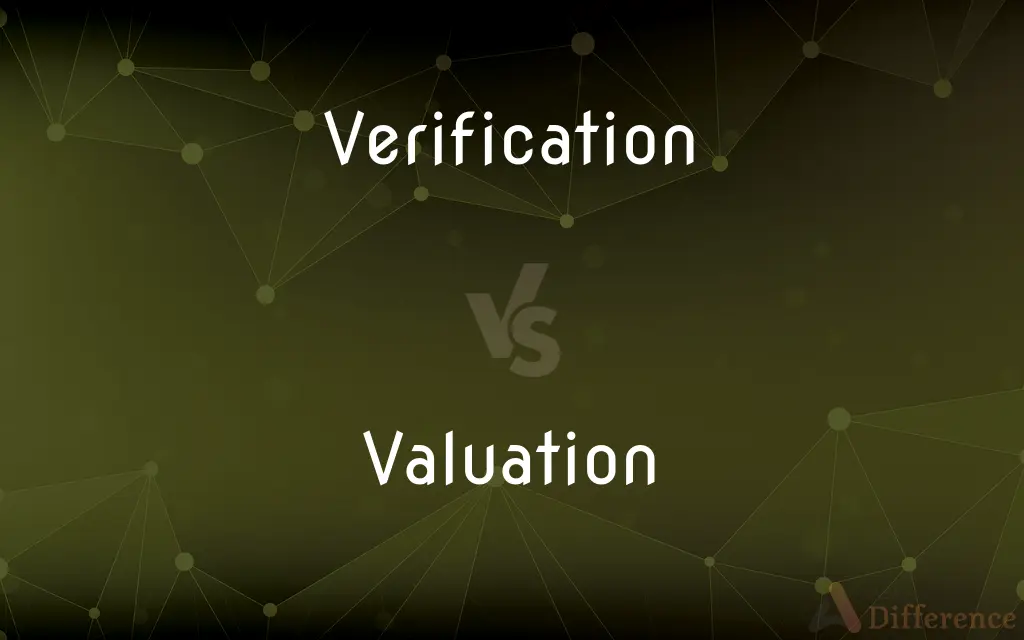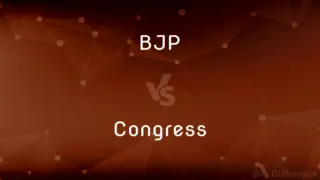Verification vs. Valuation — What's the Difference?
By Tayyaba Rehman — Published on October 22, 2023
Verification is the process of confirming the truth or accuracy of something, while valuation determines an item's worth or value.

Difference Between Verification and Valuation
Table of Contents
ADVERTISEMENT
Key Differences
Verification involves assessing if a statement, claim, or fact is accurate and true. In contrast, valuation involves determining the monetary worth of an asset or item. Verification often relies on evidence or proofs that substantiate or refute claims, whereas valuation is based on market conditions, demand, and several other factors that influence an item's value.
While the process of verification is commonly associated with data, documents, and facts, valuation is often linked to assets, companies, or properties. Verification seeks to ensure authenticity, and once verified, a claim or data can be considered reliable. In the realm of valuation, the focus shifts to estimating the fair market price or the potential selling price of an asset.
It's noteworthy that verification doesn't inherently provide value to an item; it merely confirms or denies a given assertion. Valuation, on the other hand, not only assigns a value but also provides a basis for financial decisions, like selling, buying, or insuring an asset.
In everyday scenarios, verification could relate to checking if a piece of information is correct, like verifying one's identity or credentials. Valuation, meanwhile, might be sought when intending to sell a house, buy a business, or assess the worth of a collectible.
Although both verification and valuation have their distinct applications, they serve the broader purpose of providing clarity, whether about the authenticity of information or the worth of an asset, ensuring informed decisions.
ADVERTISEMENT
Comparison Chart
Primary Focus
Confirming truth or accuracy.
Determining worth or value.
Associated With
Data, documents, facts.
Assets, companies, properties.
Outcome
Proves authenticity.
Assigns a monetary value.
Basis of Process
Evidence or proof.
Market conditions, demand, etc.
Implication for Decision
Provides clarity on the truth of information.
Provides a basis for financial decisions.
Compare with Definitions
Verification
The act of confirming the truth or accuracy.
The documents underwent a thorough verification before approval.
Valuation
The process of determining worth.
The valuation of the property was higher than expected.
Verification
Ensuring authenticity or correctness.
The verification of the data ensured its reliability.
Valuation
Assigning a financial value based on various factors.
The art piece's valuation was influenced by its historical significance.
Verification
A process of establishing certainty.
He passed the verification process for the job application.
Valuation
Establishing the fair market price of an item.
The diamond's valuation was done by a certified gemologist.
Verification
Validating the integrity of information.
The software requires a two-step verification for security reasons.
Valuation
Estimating the monetary value of an asset.
The company sought a professional valuation before the sale.
Verification
Substantiating or refuting a claim.
The experiment's results are awaiting verification.
Valuation
Assessment of potential selling price.
The valuation report indicated a strong market demand for the product.
Verification
The act of verifying or the state of being verified.
Valuation
The act or process of assessing value or price; an appraisal.
Verification
A sworn statement attesting to the truth of the facts in a document.
Valuation
Assessed value or price.
Verification
A sworn statement attesting that a pleading is true to the best of one's knowledge.
Valuation
An estimation or appreciation of worth, merit, or character
Set a high valuation on friendship.
Verification
The act of verifying.
Valuation
An estimation of something's worth.
Verification
The state of being verified.
Valuation
The process of estimating the value of a financial asset or liability.
Verification
Confirmation; authentication.
The detective needs verification of your whereabouts last night.
Valuation
An assignment of truth values to propositional variables, with a corresponding assignment of truth values to all propositional formulas with those variables (obtained through the recursive application of truth-valued functions corresponding to the logical connectives making up those formulas).
Verification
(legal) A formal phrase used in concluding a plea, to denote confirmation by evidence.
Valuation
A structure, and the corresponding assignment of a truth value to each sentence in the language for that structure.
Verification
(mathematics) The operation of testing the equation of a problem, to see whether it truly expresses the conditions of the problem.
Valuation
(algebra) A measure of size or multiplicity.
Verification
The act of verifying, or the state of being verified; confirmation; authentication.
Valuation
A map from the class of open sets of a topological space to the set of positive real numbers including infinity.
Verification
Confirmation by evidence.
Valuation
The act of valuing, or of estimating value or worth; the act of setting a price; estimation; appraisement; as, a valuation of lands for the purpose of taxation.
Verification
Additional proof that something that was believed (some fact or hypothesis or theory) is correct;
Fossils provided further confirmation of the evolutionary theory
Valuation
Value set upon a thing; estimated value or worth; as, the goods sold for more than their valuation.
Since of your lives you setSo slight a valuation.
Verification
(law) an affidavit attached to a statement confirming the truth of that statement
Valuation
An appraisal of the value of something;
He set a high valuation on friendship
Valuation
Assessed price;
The valuation of this property is much too high
Common Curiosities
Can valuation be subjective?
Yes, valuation can be influenced by subjective factors like perceived value, making it sometimes vary among experts.
Why is verification important?
Verification ensures the reliability and authenticity of information, critical for decision-making and trust.
What does verification aim to achieve?
Verification aims to confirm the truth or accuracy of information, statements, or claims.
When might one require a valuation?
Valuation might be needed when selling/buying assets, for insurance purposes, or to determine a business's worth.
Can verification be applied to people?
Yes, verification can be used to confirm a person's identity, credentials, or background.
How is valuation different from verification?
While verification confirms authenticity or truth, valuation determines the monetary worth of an asset or item.
How does verification impact trust?
Verification, when done correctly, can build trust by ensuring the authenticity and truth of information.
Are there tools for digital verification?
Yes, there are digital tools like two-factor authentication and digital signatures for verification.
Is verification always 100% accurate?
While verification aims for accuracy, human error or misleading information can sometimes impact its accuracy.
Is verification necessary for all information?
While not always mandatory, verification is recommended for critical or impactful information to ensure accuracy.
Can a valuation change over time?
Yes, valuations can fluctuate based on market conditions, demand, or other influencing factors.
What factors influence valuation?
Market conditions, demand, comparables, and intrinsic qualities can all influence valuation.
How do appraisers determine valuation?
Appraisers use comparables, market trends, and specialized knowledge to determine valuation.
What's the role of a valuation expert?
A valuation expert assesses and determines the worth of assets, often providing a detailed report.
Why might two experts have different valuations?
Different experts might weigh factors differently or have varying perceptions, leading to different valuations.
Share Your Discovery

Previous Comparison
BJP vs. Congress
Next Comparison
Light Novel vs. MangaAuthor Spotlight
Written by
Tayyaba RehmanTayyaba Rehman is a distinguished writer, currently serving as a primary contributor to askdifference.com. As a researcher in semantics and etymology, Tayyaba's passion for the complexity of languages and their distinctions has found a perfect home on the platform. Tayyaba delves into the intricacies of language, distinguishing between commonly confused words and phrases, thereby providing clarity for readers worldwide.














































